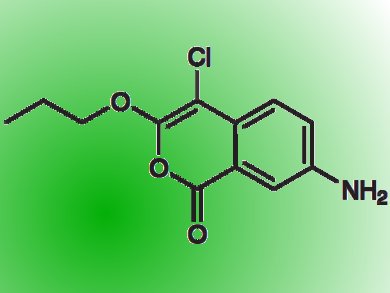Toxoplasma gondii is a parasitic microorganism that causes a disease known as toxoplasmosis. The severity of this disease is variable. In some cases, the infection causes an influenza-like syndrome, whereas in people with a weak immune system, such as young children or pregnant women, Toxoplasma gondii induces a serious illness and can cause lethal brain inflammation.
Matthew Child, Stanford University School of Medicine, USA, investigated the biochemical mechanisms regulating the parasite’s interactions with host cells. The researchers discovered that a substituted chloroisocoumarin (JCP174; pictured), a chemical that enhances the parasitic invasion of host cells, inhibits TgPPT1, a protein that removes thioester-linked palmitoyl groups on target proteins. This finding demonstrates that TgPPT1 activity decreases the ability of Toxoplasma gondii to invade host cells and suggests that palmitoylation inhibitors might help fighting this parasitic infection.
- Small-molecule inhibition of a depalmitoylase enhances Toxoplasma host-cell invasion,
Matthew A Child, Carolyn I Hall, Josh R Beck, Leslie O Ofori, Victoria E Albrow, Megan Garland, Paul W Bowyer, Peter J Bradley, James C Powers, John C Boothroyd, Eranthie Weerapana, Matthew Bogyo,
Nat. Chem. Biol. 2013.
DOI: 10.1038/nchembio.1315




